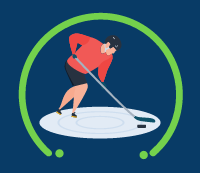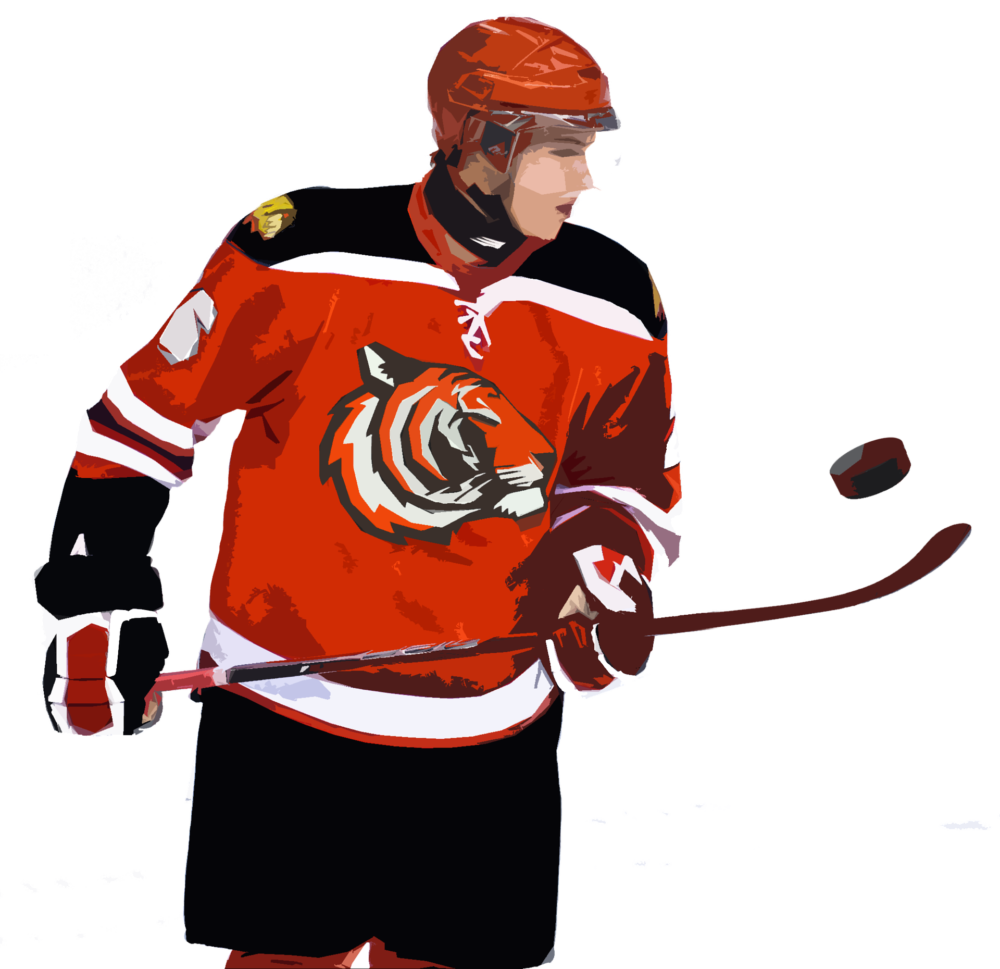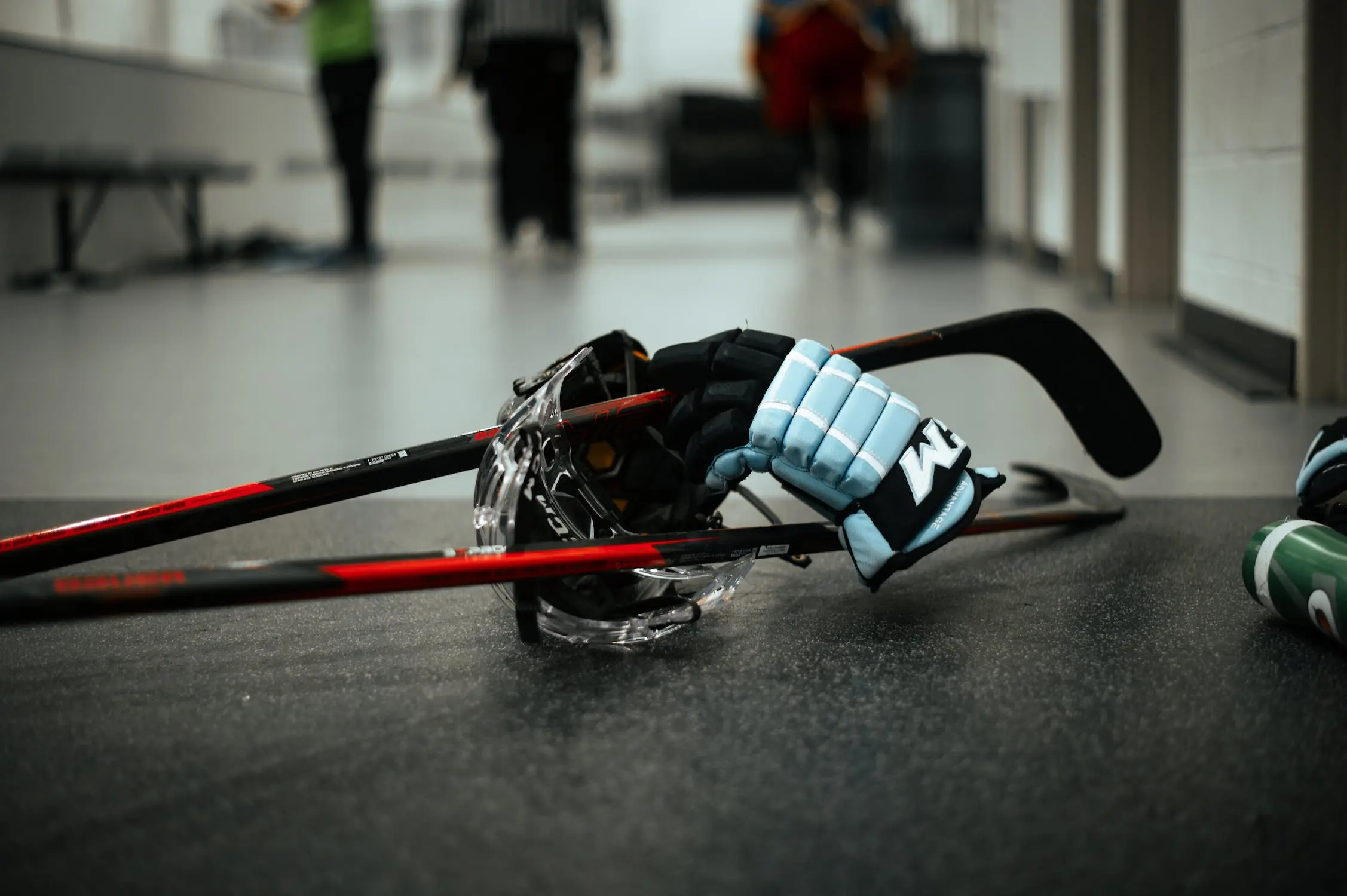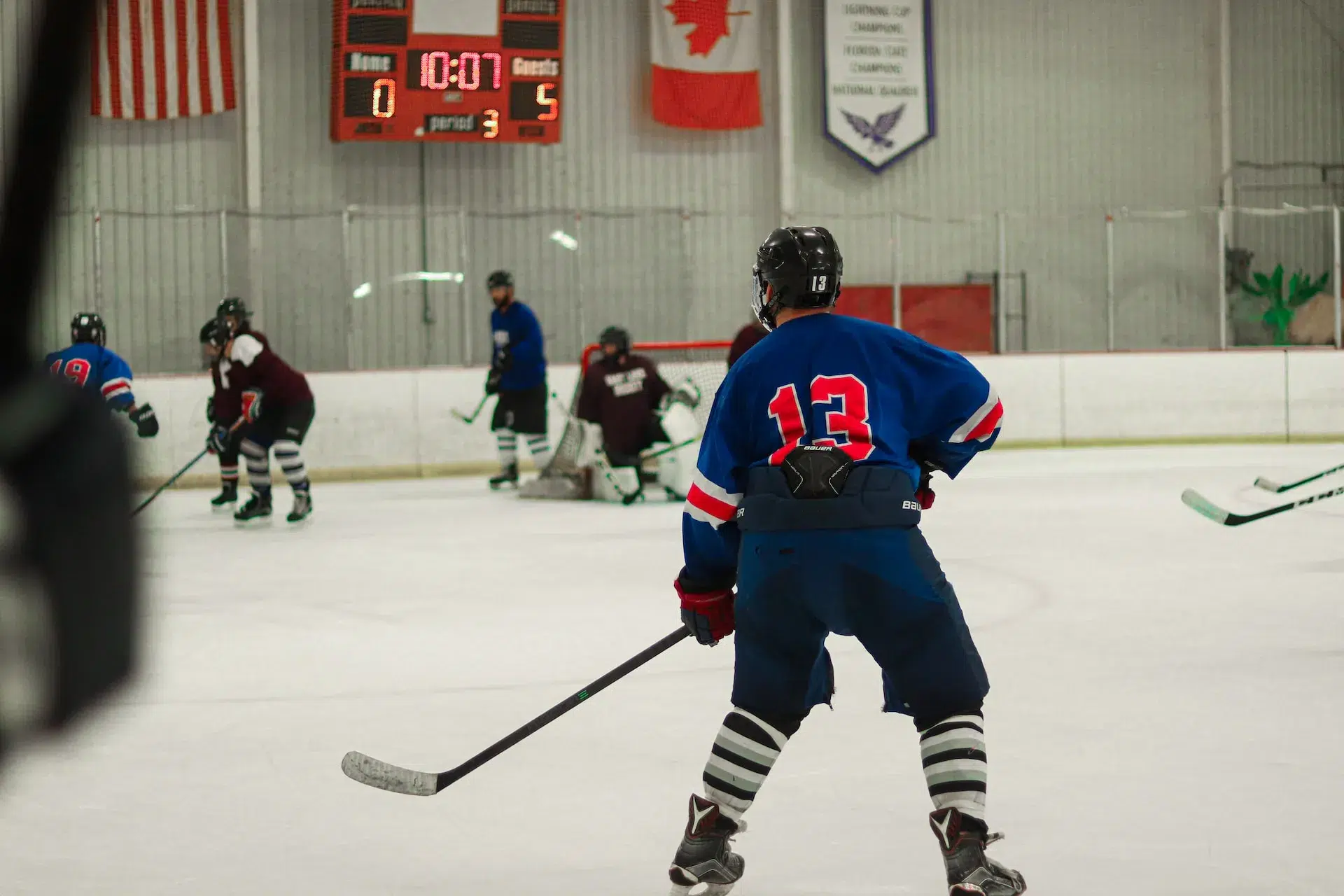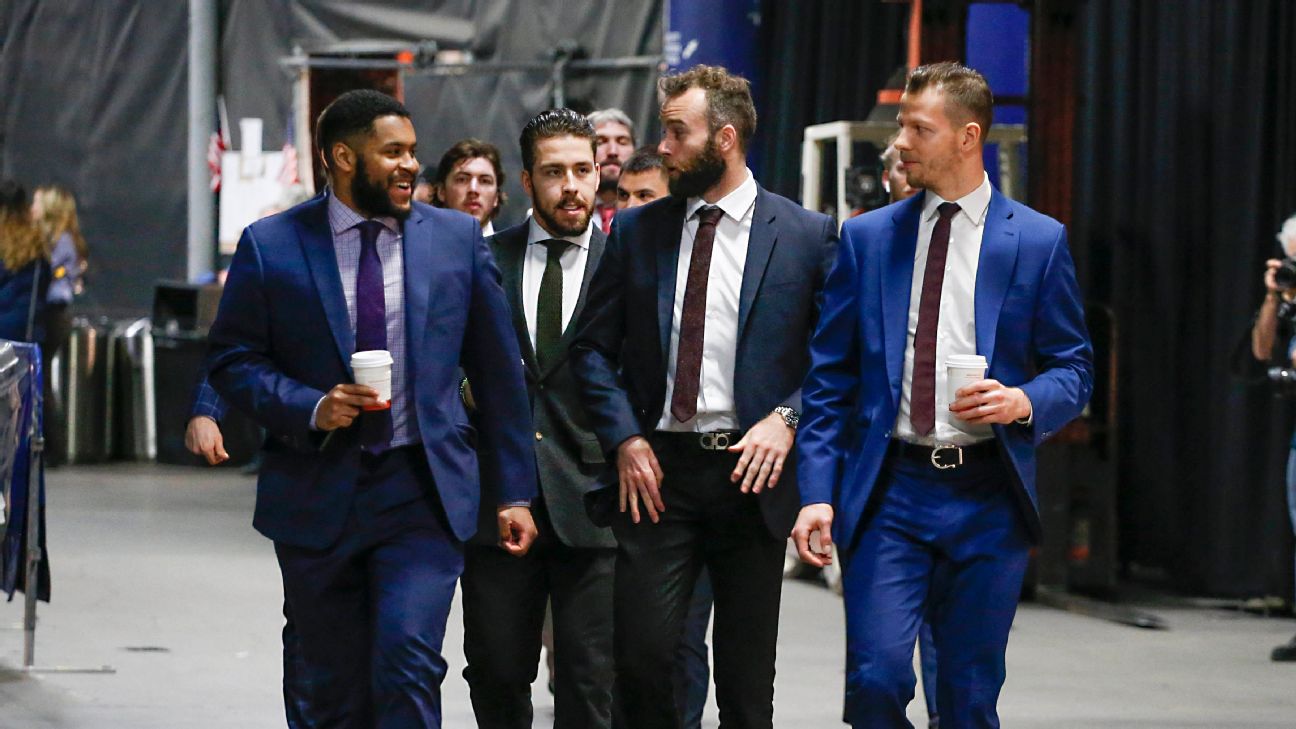Getting better at hockey isn’t just about skating harder or shooting more. It’s about learning how to move without the puck, keeping your stick in the right spot, watching film, and building habits that win games, not just shifts.
So, I’ve pulled together real tips that work: how to shoot deceptively, find space in front of the net, improve off-ice, and avoid wasting money on gear you don’t need yet. Whether you’re just starting or pushing to level up, these are the insights that make a difference.
Looking to deepen your understanding of ice hockey? Explore our comprehensive guide – the ultimate resource for mastering the game. Uncover the strategic roles and responsibilities of different ice hockey positions and get started with the fundamentals in our informative beginner’s guide on Ice Hockey .
Physical Fitness Tips for Hockey
Hockey is explosive. If you’re gassed after your first shift, it doesn’t matter how good your hands are. Your fitness drives your performance—and your recovery.
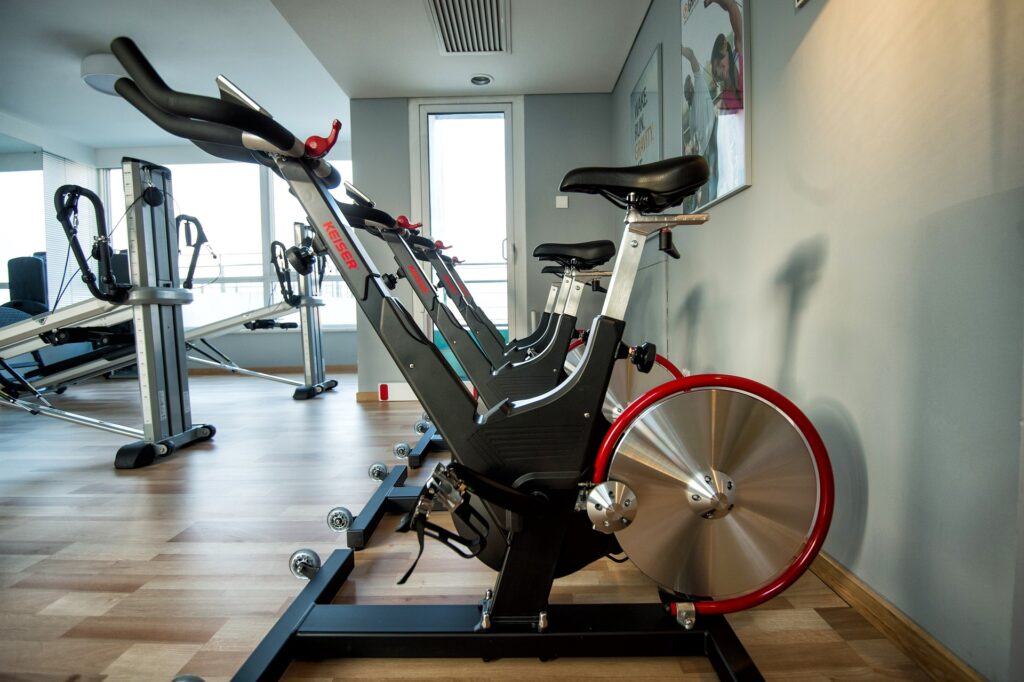
Here’s how to train smarter:
-
Skating Power = Leg Strength + Core Stability
Squats, lunges, planks, and single-leg work should be your go-to. They directly translate to faster, more stable skating. -
Condition with Purpose
Use HIIT, sprints, and short-interval cardio (bike, sledge pushes, or hill runs) to match hockey’s pace. Long slow cardio won’t cut it on its own. -
Train Off-Ice Like You Play On-Ice
Stickhandle with weighted pucks. Shoot 100+ pucks daily. Work your lateral foot speed and ankle mobility. -
Recovery = Gains
Prioritize sleep, hydration, stretching (hips, groin, hamstrings), and rest days. Sore? Mobility work > static stretching. -
Late Games = Tired Legs
Recreational games often run late—train your energy systems so you’re not flat in the third period.
Stay at the top of your game with these physical fitness tips specifically tailored for ice hockey players like you.
| Fitness Tips | Description | Additional Tip |
|---|---|---|
| Balance training | Improve balance and prevent injury with exercises like single-leg squats, Bosu ball exercises, or balance board exercises | Add balance training to your warm-up routine to improve overall stability |
| Interval training | Improve both aerobic and anaerobic endurance with high-intensity interval training (HIIT) | Customize interval times and exercises to match the demands of hockey |
| Plyometrics | Increase power and speed with explosive exercises like jumping or bounding | Focus on proper form and land softly to prevent injury |
| Agility drills | Improve quickness and reaction time with drills like ladder runs, cone drills, or plyometric jumps | Focus on technique and footwork for maximum effectiveness |
| Rest and recovery | Proper rest and recovery allows the body to repair and grow stronger | Get 7-8 hours of sleep each night and take rest days as needed |
| Core strength | Improve stability and balance with exercises like planks, bridges, or Russian twists | Incorporate functional movements that mimic on-ice movements for maximum benefit |
| Aerobic exercise | Improve endurance with cardio workouts like running, biking, or swimming | Incorporate interval training for improved endurance |
| Strength training | Build muscle and improve balance with exercises like squats, lunges, and deadlifts | Start with lighter weights and gradually increase to avoid injury |
| Flexibility training | Increase range of motion and prevent injury with stretching, yoga, or Pilates | Stretch before and after exercise to improve flexibility and reduce muscle soreness |
Technical Skills Tips
Hockey IQ starts with the basics. But execution—under pressure, at speed—is what separates players who blend in from those who take over.
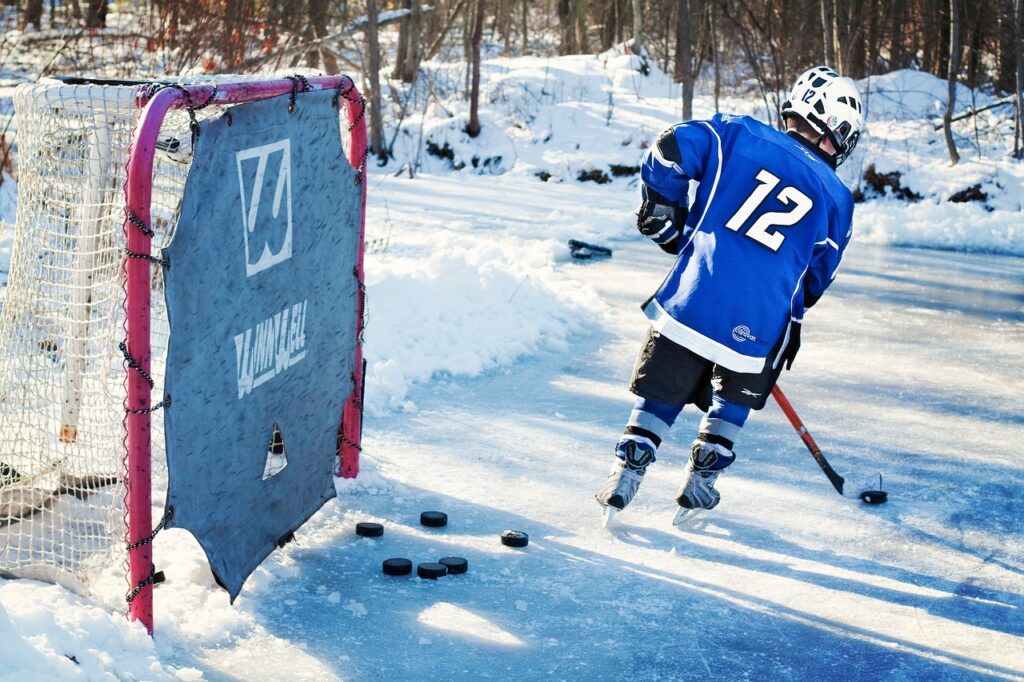
🏒 Skating
-
Master Edge Work: Good players skate fast. Great players stop, start, and turn instantly. Use drills that target inside/outside edge control.
-
Crossovers & Transitions: Practice both directions. Focus on tight turns and quick acceleration off the pivot.
-
Power = Form + Conditioning: Posture, knee bend, and hip drive matter more than brute force.
🎯 Shooting
-
Quick Release > Pure Power: Goalies stop what they see. Fast releases from deceptive angles beat them.
-
Change the Angle: Use toe drags, pull-and-release, or curl-and-drags to shift the puck’s lane.
-
Low Shots Get Tips: From the point? Aim low, around shin pad height—tip-ins come easier from these.
🎯 Passing & Receiving
-
Eyes Up: Don’t stare at the puck. Head up passing creates smarter decisions and fewer turnovers.
-
Crisp Tapes Only: Work on forehand, backhand, and saucer passes under pressure.
🔥 Stickhandling
-
Soft Hands, Fast Reactions: Use weighted pucks and rapid-response drills. Speed beats flash.
-
Body Fakes + Edge Work: Combine your footwork with upper body deception. Make defenders bite.
Below table outlines the key technical skills tips every ice hockey player should know to enhance their on-ice performance and excel in the game.
| Technical Skills Tips | Description | Additional Tip |
|---|---|---|
| Shooting | Improve accuracy and power with proper technique | Practice shooting from different angles |
| Stickhandling | Maintain possession and create chances with good skills | Keep your head up and scan the ice |
| Passing | Move the puck accurately and create scoring chances | Practice timing and accuracy with both forehand and backhand passes |
| Skating | Improve speed and agility with proper technique | Use crossovers to increase speed and agility |
| Defensive play | Prevent goals and create turnovers with solid technique | Stay between the puck carrier and the net |
| Faceoffs | Win faceoffs and gain possession with proper technique | Anticipate the drop of the puck and use your body to protect the puck |
| Checking | Execute checks effectively and prevent injury | Keep your hands and stick down and use your body to make contact |
| Power play | Score goals on the man advantage with effective strategy | Keep defenders guessing with quick passes and shots |
| Penalty killing | Prevent goals while shorthanded with effective strategy | Pressure the puck carrier and take away passing lanes |
Think the Game: Awareness & Mental Tips
Being skilled isn’t enough. Great players process the game faster than everyone else.
🧠 Off-Puck Positioning
-
Find Soft Ice: Goals come from open space, not traffic. Get to the “house” near the net, lose your defender, and reappear just in time for a rebound or tip.
-
Read the Play: Don’t chase. Anticipate where the puck’s going—especially off turnovers or rebounds.
📣 Communication
-
Talk Early, Talk Often: “One more,” “man on,” “wheel”—quick calls make your whole line faster.
-
Silent Cues Matter Too: Stick taps, shoulder checks, even eye contact help teammates know what’s coming.
🎯 Mental Game
-
Visualize Every Shift: See yourself scoring, forechecking, breaking up a pass.
-
Stay Composed: In pressure moments, take a stride before acting. Don’t panic the puck away.
-
Watch Film: Study your shifts, track missed opportunities, and learn from pros like Kucherov or Crosby.
For effective training techniques to enhance your skating skills, explore our guide on ice hockey skating drills. These drills improve speed, agility, and overall performance on the ice, helping you develop strong edges and execute quick turns for success in the game.
Elevate your game with these key mental preparation tips for goal setting, visualization, positive self-talk, mindfulness, and more.
| Mental Preparation Tips | Description | Additional Tip |
|---|---|---|
| Goal setting | Set specific and achievable goals for focus and motivation | Write down goals and review regularly |
| Visualization | Use mental imagery to prepare for game situations and build confidence | Include specific details in visualizations |
| Positive self-talk | Encourage and motivate yourself with optimistic self-talk | Use empowering language to boost confidence |
| Mindfulness | Practice mindfulness to reduce stress and improve focus | Incorporate deep breathing or meditation |
| Pre-game routine | Establish a consistent routine for mental preparation and focus | Include relaxation techniques in routine |
| Post-game reflection | Reflect on performance to identify areas for improvement and build confidence | Focus on positives and areas for growth |
| Team building | Build positive relationships with teammates to improve communication and team dynamics | Participate in team bonding activities |
| Mental toughness | Develop resilience to overcome challenges and improve mental preparedness | Embrace challenges as opportunities for growth |
| Motivation | Find personal motivation and purpose to improve mental focus and drive | Keep a journal to track progress and accomplishments |
Practice Habits & Off-Ice Preparation
Scoring in games starts with consistency at practice—and it doesn’t stop when you leave the rink.
🧠 Develop Game Awareness
-
Watch elite players like Draisaitl or Stamkos—learn how they move off the puck.
-
Predict where the play goes: anticipation beats speed.
-
Keep your head up. Read pressure. Know your zone and your teammates’ positions.
📹 Use Video to Improve Faster
-
Record your shifts or drills. Self-review is massively underused.
-
Spot positioning mistakes, hesitations, or missed reads.
-
Watching film teaches spacing, reaction timing, and movement efficiency.
🏋️♂️ Prioritize Off-Ice Training
-
Add weighted puck drills to improve hand strength and puck control.
-
Off-ice shooting on synthetic ice or shooting pads builds muscle memory.
-
Sprint intervals, plyometrics, and core work directly translate to ice explosiveness.
🕒 Consistency Beats Intensity
-
20 minutes of focused practice daily > 2 hours of sporadic weekend work.
-
Stickhandle during commercials. Shoot 50 pucks before dinner. Build habits.
Beginner Tips: What to Know Before Starting Ice Hockey
Starting hockey isn’t just about buying gear or signing up for ice time — it’s about knowing what you’re getting into, how to prepare, and how to enjoy the process.
✅ Don’t Overspend on Gear at the Start
-
Borrow first, if possible. Most rinks or teams can help you find used gear.
-
Early on, stick flex or curve won’t matter much — focus on learning the basics.
-
Use Facebook Marketplace, eBay, or team gear swaps before investing in new equipment.
🧊 Find the Right Team Fit
-
Skip cold intros at the rink desk — use Instagram or Facebook to find local rec teams.
-
Ask around. A friend’s intro helps more than showing up solo.
-
Every team has its own vibe. If one group isn’t your fit, try another.
💰 Understand the Costs (and Insurance Gaps)
-
Expect annual registration fees, plus team contributions for ice time and tournaments.
-
Many rec leagues offer basic insurance — but it might not cover much.
-
Consider private sports insurance if you rely on your body for your profession.
📆 Know the Time Commitment
-
Even rec hockey means late-night practices, weekend travel, and early wake-ups.
-
Ask the team about expectations for practice attendance and game availability.
🩹 Be Real About Risk
-
Hockey’s physical. Minor injuries happen. Make sure you’re okay with the risks — and wear full protection (yes, even cages).
Shooting & Scoring Tips: How to Score More Goals
If there’s one thing that separates average players from great ones, it’s this: they shoot with purpose and score consistently, not because they’re stronger, but because they’re smarter.
🎯 Shoot More (Especially in 50/50 Moments)
Wayne Gretzky said it best: “You miss 100% of the shots you don’t take.” Don’t hesitate in 50/50 spots. If you’re unsure whether to shoot or pass, lean toward shooting. Coaches reward decisiveness.
⚡ Develop a Quick Release
-
A fast release beats power 90% of the time.
-
Work on toe drag releases, no-pull snapshots, and off-angle shots.
-
Goalies react late if they can’t read your hands, so shoot while changing direction or after dekes.
😈 Be Deceptive
-
Look off your target. Fake your shot. Make the goalie guess.
-
Use fake shots into dekes. Once you earn respect for your shot, openings for passes and fakes increase.
📏 Aim Low to Score High
-
Shots around 6 inches to 2 feet off the ice are the toughest to stop.
-
Defensemen: keep your point shots low for deflections and screens.
-
Forwards: low shots give you rebound chances even if the first one doesn’t go in.
🔁 Build a Habit: 100+ Shots Daily
-
The pros shoot hundreds of pucks a day, often after practice or off-ice.
-
Use pucks and shooting pads at home. Track how quickly you can release under pressure.
Incorporate our expert tips to elevate your game during power plays and understand the flow of the game across different hockey periods. Check out our Power Play Hockey article for in-depth Power Play strategies.
Off-Puck Positioning: How to Get Open and Score More
Great scorers don’t just shoot well, they know where to be. Positioning without the puck is what gets you the puck in the first place.
🧠 Think Ahead: Go Where the Puck Will Be
-
The best players anticipate rebounds, passes, and broken plays.
-
Always scan for space as the play develops. Don’t just follow the puck — find gaps.
🏠 Own the “House”
-
The slot, crease, and inner hashmarks, this is where most goals are scored.
-
Drift in and out of the house: If you’re tied up, skate out to lose your defender and sneak back in just before a shot is taken.
🏒 Stick Down, Ready for Anything
-
Keep your blade on the ice, especially around the crease.
-
Ready sticks lead to quick one-timers, tip-ins, and rebound goals.
-
If a D-man is lifting your stick, press it down into the ice to maintain control.
🚀 When in Doubt, Crash the Net
-
Don’t overthink. If you’re lost in the zone, head toward the crease.
-
Arrive just as the shot is taken, timing beats strength every time.
🕵️♂️ Study Film
-
Watch players like Stamkos, Draisaitl, or Kucherov. See how they find soft spots.
-
Even 5 minutes of video a day builds game sense faster than any drill.
Stickhandling and Deception: Beat Defenders Without Overhandling
Elite stickhandlers don’t just dangle — they manipulate space, pace, and angles to force mistakes.
🖐 Keep It Simple and Under Control
-
Puck on a string? Cool. But if you overhandle, you slow down the play and telegraph your move.
-
Stickhandle just enough to change angle or freeze a defender. Let speed and timing do the rest.
🧊 Heads Up, Hands Out
-
Keep your head up. Always.
-
Extend your hands from your body — this gives you more reach and better control under pressure.
🎭 Deception Wins
-
A small head fake, a shoulder drop, or looking one way while passing or shooting the other — these are simple moves that create time and space.
-
Use toe drags, pull-and-push, or weight shifts to change angles. Even a subtle delay opens passing or shooting lanes.
🧲 Train for Reaction, Not Just Rhythm
-
Don’t just stickhandle cones. Use reaction-based drills: balls with numbers, mirrored stickhandling, or partner disruption drills.
-
Practice with weighted pucks off-ice to improve control, then go lighter for speed on the ice.
🛑 Use It to Control Tempo
-
If your team is scattered, a calm stickhandle can slow the game and reset the structure.
-
If the defense is tight, quick pulls and lateral moves can break seams wide open.
Applying ice hockey tips is crucial, but so is choosing the right gear. Explore the best hockey brands in our guide to enhance your performance and safety on the ice.
Reading the Play and Game Awareness: Think One Pass Ahead
Success in hockey isn’t just about speed or strength, it’s about reading what’s coming before it happens.
🧠 Train Your Eyes
-
Watch the play develop, not just the puck.
-
Scan for passing options, defensive gaps, and forecheck pressure before you get the puck.
-
Top players can glance twice per second. That’s the edge.
📍 Positioning Without the Puck
-
Scorers find soft ice — the high slot, backdoor, weak side and get there before the puck arrives.
-
Drift into open lanes, then stop. Defenders lose you when you stop moving unpredictably.
🧊 Slow the Game Down
-
When pressure builds, don’t panic. A stride and a head check buys time.
-
Make confident decisions, even a simple chip or bank pass is better than a blind giveaway.
📺 Watch Game Film
-
Want to level up fast? Watch players like Draisaitl, Stamkos, or Kucherov.
-
Note how they time their arrivals into scoring areas, how long they hold the puck, and when they accelerate into space.
🗣 Talk More
-
Most amateur players don’t communicate enough.
-
Call out coverage switches, open ice, or man-marking. If your teammates are silent, be the one who talks first.
Positioning and Scoring Without the Puck
You don’t need the puck to be dangerous. Most goals are scored by players who know where to be, not just what to do with the puck.
🏠 Get to the House
-
The “house” is the area between the faceoff dots and just above the crease.
-
It’s where rebounds drop, deflections happen, and chaos leads to goals. If you’re not sure where to go, go to the net.
🕵️♂️ Lose Your Defender
-
Step out of the slot, then sneak back in just before the shot, a classic bumper play timing trick.
-
Delay your movement or loop around behind the net to create space.
🏒 Stick Always on the Ice
-
Ready sticks get deflections. Lazy sticks miss chances.
-
Keep two hands on your stick when crashing the net. If pressure comes, press down to avoid stick lifts.
🎥 Watch Tape and Copy Greats
-
Study scorers like Draisaitl or Stamkos. Notice how they drift into soft spots or time their movement perfectly for a rebound.
Game Awareness & Ice Vision Tips
Knowing where the puck is matters. But knowing where it’s going next? That’s what separates good players from great ones.
Read the play early. I watch a lot of game film: NHL clips, my own scrimmages, even local 4-on-4 league games. The more I study, the better I get at predicting puck movement, defensive breakdowns, and when to cut to space instead of chasing the play.
Always scan before you get the puck. My personal rule is to check over your shoulder once before receiving a pass, and twice if I’m in the neutral zone. It gives me a map of teammates, defenders, and passing options before the puck even hits my stick.
Keep your feet moving. Static players are easy to cover. I’ve scored on rebounds and second efforts just by staying active after making the initial play. If you’re unsure where to go, head to the net or find soft space near the slot.
Train your peripheral vision. I use tennis balls and small nets to stay sharp, focusing forward while reacting to movement around me. Eventually, you pick up cues without turning your head.
Communicate. Clearly and often. Great teams are vocal. Calls like “middle,” “reverse,” or “time” buy extra seconds. I’ve watched great plays break down just because no one said a word.
Watch the weak side. Most players follow the puck. Skilled players look for lanes opening up away from it. That’s where high-danger chances develop.
The smartest players don’t just react to the game. They shape it by anticipating what’s next.
Nutrition Tips
Nutrition plays a crucial role in the performance and recovery of ice hockey players. Following are some nutrition tips for optimizing your performance on the ice:
Importance of Proper Nutrition
Proper nutrition is essential for ice hockey players to perform at their best. Players should take a well-balanced diet rich in protein, carbohydrates, healthy fats, vitamins, and minerals. This diet will help in improving energy, endurance, and strength.
Pre-Game and Post-Game Meals
Pre-game meals should be consumed 2-3 hours before game time. it should consist of digestible carbohydrates like fruits, vegetables, and whole grains. Post-game meals should be consumed within 30-60 minutes after the game. It should include a mix of carbohydrates and protein to help repair muscle tissue.
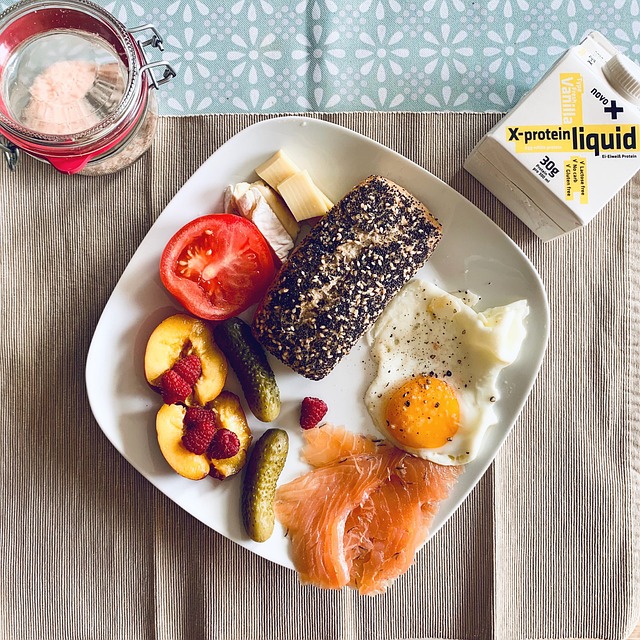
Hydration Tips
Hydration is critical in ice hockey as players can lose a significant amount of water through sweat during games and practices. It is recommended to take at least 8-10 glasses of water per day before, during, and after games & practices. Sports drinks can also be taken besides water.
Timing of Meals and Snacks
Eating small, frequent meals and snacks throughout the day can help maintain energy levels and prevent hunger. Players should aim to consume a meal or snack every 3-4 hours, especially on game days.
Avoiding Junk Food and Sugary Drinks
These food types have low nutritional value and can lead to a decline in performance and weight gain. Players should limit their intake of processed foods, sugary drinks & snacks, and saturated fat.
Check out below table, it outlines essential nutrition tips for athletes, including portion control, timing of meals, and a balanced diet for optimal health and performance.
| Nutrition Tips | Description | Additional Tip |
|---|---|---|
| Hydration | Staying hydrated is crucial for performance and recovery | Drink water throughout the day, not just during exercise |
| Protein | Eating protein can help build and repair muscles | Choose lean protein sources such as chicken, fish, and beans |
| Carbohydrates | Consuming carbohydrates can provide energy for exercise | Focus on complex carbohydrates such as whole grains and fruits |
| Healthy fats | Incorporating healthy fats can help with brain function and energy | Include sources such as avocado, nuts, and olive oil |
| Vitamins and minerals | Getting enough vitamins and minerals is important for overall health | Eat a variety of colorful fruits and vegetables to get a range of nutrients |
| Timing | Eating before and after exercise can aid in performance and recovery | Choose easily digestible foods before exercise and a mix of protein and carbohydrates after |
| Portion control | Monitoring portion sizes can help maintain a healthy weight and fuel properly | Use a food scale or measuring cups to ensure proper portion sizes |
| Balanced diet | Eating a balanced diet with a variety of foods is important for overall health and performance | Aim to fill half your plate with fruits and vegetables at each meal |
Looking to enhance your hockey skills? Refine your techniques with our goaltending guide and master body checking techniques with our body checking article. Elevate your game and make a significant impact on the ice!
Frequently Asked Questions About Ice Hockey Tips
How do I get better at ice hockey fast?
Focus on fundamentals: improve your skating, work on your shot daily, and develop game sense through video study. Even 20 minutes of stickhandling at home makes a difference.
What’s the best way to score more goals?
Practice deceptive releases and quick low shots. Keep your stick on the ice, crash the net, and shoot in 50/50 situations. Don’t wait for perfect chances — take smart ones early and often.
How important is off-ice training for hockey?
Crucial. Strength, cardio, and agility off the ice directly translate to performance. Off-ice puck handling drills and shooting reps accelerate improvement faster than ice time alone.
What should I know before joining a rec league or amateur team?
Expect late-night practices, weekend games, team dues, and a serious time commitment. Try borrowing or buying used gear first. Use social media or local rinks to find open teams.
How can I avoid injuries in hockey?
Wear properly fitted protective gear, including a full cage if needed. Warm up before every session, stretch regularly, and avoid overextending during shifts. Hockey is physical, but you can lower the risk with good habits.
Do I need expensive gear to play well?
Not at all. Fit matters more than brand. Start with affordable or secondhand gear until your skills develop. Prioritize safety (like helmets and gloves) before upgrading stick specs.
From the Locker Room: My Take
Every good hockey player I’ve ever met from junior teams to weekend leagues, shares two traits: consistency and curiosity. They put in reps when no one’s watching, and they never stop learning.
Some of the best breakthroughs I’ve had didn’t come from drills they came from watching a better player handle pressure, read the ice, or rip a shot I hadn’t seen before. Hockey rewards pattern recognition and grit. That’s why every minute you spend taping your stick, fixing your stride, or watching game film adds up.
Whether you’re chasing goals or just looking to enjoy the game more, don’t underestimate small improvements. The best players don’t have just one strength, they get a little better at everything, all the time.
Looking to improve your ice hockey skills? Don’t miss out on our valuable resources! Check out our guides on icing in hockey and ice hockey rules to stay informed and play the game effectively. Elevate your game by staying knowledgeable about both the rules and strategic elements of the game.
